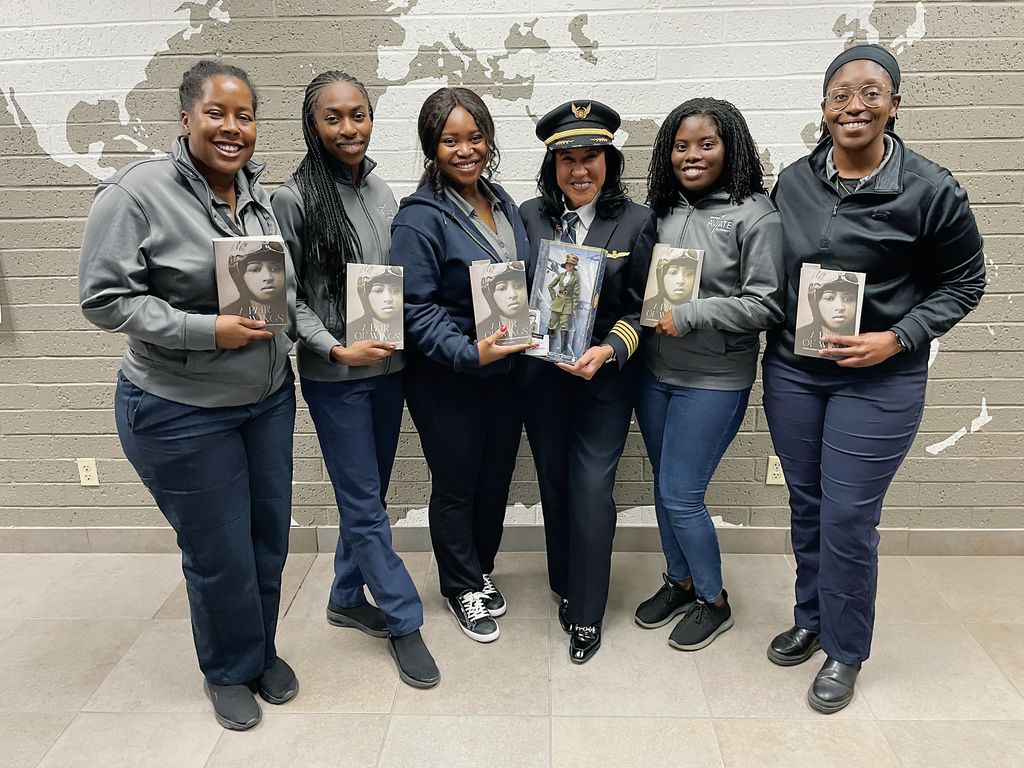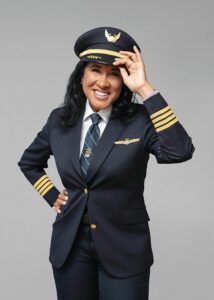We can all easily remember the first time the dream to fly wrapped its arms around us and refused to let go. That was Carole Hopson’s story. Becoming a pilot was to her not a question, it was more of a challenge, and as a young Black woman, the hurdles could have seemed too high to overcome.
Carole is not a person who saw those challenges as insurmountable. Previously, as a corporate executive and journalist, she met every obstacle with gusto. When she started training to fly, her quest to her current role as a United Airlines Boeing 737 captain based out of Newark, New Jersey, could have been derailed many times. It took a solid plan, years of work, and a combination of brains, perseverance, and an infectious positive attitude to make her dream come true.
And she is just getting started. In addition to launching the “100 Pairs of Wings” program following the success of her biography of Bessie Coleman, A Pair of Wings, Hopson is also a mentor in United’s Aviate Academy, through which the airline intends to fulfill its promise of a more diversified workforce.

FLYING Magazine (FM): Explain your early interest in flying—when you first noticed airplanes—and how that impacted your future.
Carole Hopson (CH): I have wanted to fly airplanes ever since I can remember. But this was not a popular career aspiration for a girl coming of age in the 1960s and ‘70s. It felt like a dream that I should keep to myself. And so I did. But it was something that just wouldn’t leave me. Even though I pursued many remarkable fields, I still wanted to follow this path.
FM: Your husband, Michael, was instrumental in helping you move from being a corporate executive and journalist to becoming a professional pilot. What did he do to help you?
CH: The first thing that my husband Michael did was he listened. He never laughed at me, and then he put real money and enthusiastic support behind my training. He bought me a discovery flight and paid for the initial lessons. He also helped me create what he called an “exit strategy.” We put together a financial plan with a timeline to forge my dream into a goal.
FM: Once you decided to train to become an airline pilot,what support system did you have in terms of family life as well as financially?
CH: That exit strategy that I talked about was detailed. Before I up and left my job, I took another position so that I could save the money for flight school. We mapped out which flight schools I would attend and planned for the accelerated courses, as well as cost—both financial and emotional. Then we bought a house and moved from Manhattan to New Jersey so that I could be close to small airports and flight schools. Then we stuck to the plan.
FM: How did that plan work out?
CH: What no one factored in was September 11th. That fateful day changed the lives of so many. Like others, Michael and I decided to have a family, and were fortunate and had two sons. They changed my life more than I could have ever imagined. I never thought I would love anything as much as flying, but my children changed my point of view. I loved my infant and toddler more than anything and stayed home for 14 years raising our boys before getting the training and hours I needed to get to where I am today.
FM: As an international airline pilot, as well as mother, author, public speaker, and philanthropist, what personal skills, tricks, and habits do you use to balance everything?
CH: I call it the law of three because I can juggle three balls at a time: Family. Flying. Book. And then there’s grace. Try to be graceful, try to allow yourself grace, and then pay attention to the task at hand and ask for help.
FM: Explain what the goals of your Jet Black Foundation are as well as the 100 Pairs of Wings Project, and tell us why this is needed.
CH: Jetblackfoundation.org was founded to recruit and train African-American female pilots. Less than one percent of our current pilot workforce is African-American and female. We have to begin to recruit from talent pools that we have never searched before. The 100 Pairs of Wings project will begin in 2025, with a goal to raise funds to put 10 Black women through flight training every year for the next 10 years. This is problem-solving that is good for business and ultimately is workforce development in its purest form.
FM: Why is it important that the aviation industry, corporations, and high-net-worth individuals support your foundation with their donations?
CH: Post-COVID travelers have returned with gusto. Private aircraft acquisition and cargo flying have also seen an increase in demand. Last summer and over the 2022 holidays, we saw record numbers of flights canceled because of staffing shortages, and those staffing challenges will continue. We must begin to think about how we solve business challenges in a different way. Recruiting in brand-new arenas is a solid strategy, and investing in people is the smartest business investment we can make.
FM: What personal or aviation similarities do you share with Bessie Coleman, who you wrote about in your book, A Pair of Wings?
CH: It’s an honor to compare any part of my being with Coleman’s legacy. But for sure I have learned from studying her and have tried to adopt some key principles that I have learned. Coleman gets lots of credit for being beautiful and brave, and she did indeed have these attributes in abundance, but what I learned from her is that she took these raw materials and turned them into problem-solving superpowers. From this observation, I have learned that obstacles have opportunity.
FM: In Michelle Obama’s latest book The Light We Carry she explains her “When they go low, we go high” mantra. As a woman of color coming up through the ranks in the airlines, did you ever have to employ that same philosophy?
CH: I smile as I write this: yes, every day! Learning how to deescalate and focus on the mission is key. I am human, so an insult, a curt response, or a mean look can be a distraction. But I don’t own that; someone else does. I have a job to do and keeping my crew and passengers safe is the only goal. Besides, it’s my decision to keep my control or to give it away. I have decided to keep it.
FM: What is the one big message you want to share directly with young girls and women of color that may read this and become inspired to follow a career path similar to yours?
CH: First, decide that if you love a thing, it’s worth the pursuit. Secondly, find a mentor. And by this I mean a guide, not necessarily a friend who rubber stamps your every move—find someone who has been where you want to go. Learn, teach, and never stop this process. Being mentored—and mentoring someone else—is the best way to continue to evolve.
Quick 6
Is there anyone living or dead you would most like to fly with?

Two actually, Bessie Coleman and my mom.
If you could fly any airplane or helicopter you have not yet flown, what would that be?
I am thinking tall and small, so a Boeing 787 and a Pitts.
What is one airport you’ve always wanted to fly into?
The next one.
What do you believe has been aviation’s biggest breakthrough event or innovation?
The jet engine!
What is one important life lesson learned from becoming an airline pilot?
Trust in yourself. Only you can give yourself confidence, but anyone can take it away from you.
When not flying or promoting your foundation, you’d rather be…
Spending time with my husband and boys!
